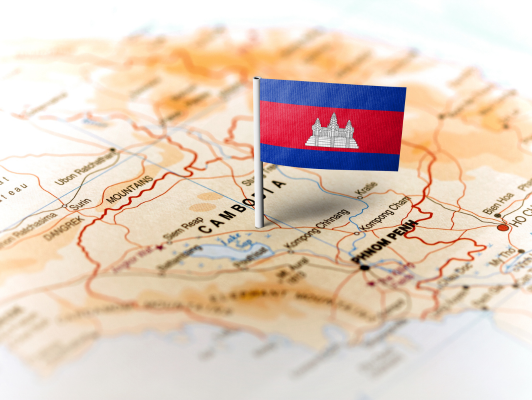Contents
Toggle
Meet David De’ Ath, founder, editor, and writer at Wonderful World English. With his extensive background as an English teacher, David provides valuable insights and practical tips on ESL for students and teachers alike.
Teaching English in Cambodia is an opportunity that attracts numerous expatriates every year, drawn by the nation’s warm hospitality and the high demand for language education.
With its rich history and culture, Cambodia offers a poignant and rewarding backdrop for educators looking to make an impact in a developing country.
English teachers are welcomed as they play an essential role in offering local students a skill that can dramatically improve their academic and professional future prospects.
To teach English in Cambodia, it is important to understand the prerequisites and legal requirements.
A bachelor’s degree and a recognized TEFL (Teaching English as a Foreign Language) certification are commonly needed.
Fluency in English and a passion for teaching are as crucial as the formal qualifications.
Cambodia presents a unique living experience with its affordable cost of living and the opportunity to immerse oneself in a distinctly different way of life.
Key Takeaways
- Teaching English in Cambodia offers a chance to contribute positively to the community.
- Certification and a degree are generally required to secure teaching positions.
- The cost of living is favorable, enhancing the appeal of working in Cambodia.

Understanding Cambodia
Cambodia is a country rich in history and culture with a landscape that ranges from bustling cities to serene rural areas.
Its economy is evolving, highlighted by a low cost of living that attracts many expatriates and tourists alike.
Geography and History
Cambodia, located in Southeast Asia, shares borders with Vietnam to the east, Thailand to the northwest, and Laos to the northeast.
Phnom Penh is both the nation’s capital and its largest city, serving as the political and economic center.
Historically, Cambodia is renowned for the majestic Angkor Wat temple complex, a testament to the country’s storied past and a significant draw for tourism.
The temple is near Siem Reap, which has developed infrastructure to accommodate international visitors.
Cultural Insights
The culture of Cambodia reflects a blend of indigenous traditions and influences from India and China.
Buddhism plays a central role in Cambodian society, with monks and pagodas present throughout the country.
Traditional Cambodian food is known for its subtle flavors, often incorporating rice and freshwater fish.
Respect for elders and a strong sense of community are integral parts of Cambodian life.
Economy and Cost of Living
Cambodia’s economy has historically been driven by agriculture, but in recent years has diversified into textiles, tourism, and construction.
Despite its growth, many citizens still engage in subsistence farming in rural areas.
The low cost of living is one of the reasons Cambodia is attractive to foreign teachers and other expatriates who can often enjoy a comfortable lifestyle on a modest income.
The food, transportation, and rental costs are significantly lower compared to Western standards.
Language and Education System
Khmer is the official language of Cambodia, encompassing both the spoken and written aspects of public and private life.
The education system has been improving, though challenges remain. English is increasingly valued, particularly in the context of globalization and economic development.
As a result, there is significant demand for English language education, with opportunities for teachers in both urban and rural settings, giving rise to a growing number of English teaching positions across the country.

Teaching English in Cambodia
Teaching English in Cambodia offers a unique opportunity for educators to immerse themselves in a culturally rich environment while fulfilling the increasing demand for English language instruction.
Market Overview
Cambodia’s education sector has expanded significantly, with English being a focal point of this growth.
English is increasingly viewed as a key skill for job opportunities, leading to a rise in language schools and teaching jobs.
Demand for English Teachers
The demand for English teachers in Cambodia is substantial, particularly for those who are native English speakers or possess a TEFL certificate.
With the integration of English in education, many schools are actively seeking qualified instructors.
Types of Teaching Jobs
Teaching jobs range from volunteer positions to full-time roles at private language schools, public schools, private schools, and universities.
Private language schools frequently offer positions but may require prior teaching experience or certification.
Working Conditions
Salaries for teaching English in Cambodia can vary widely, often reflecting teachers’ credentials and the type of institution.
Benefits such as visa sponsorship, housing, and coverage of living costs may also be part of the compensation package.

Qualifications and Requirements
To teach English in Cambodia, educators often need a blend of certifications and language proficiency.
Certain institutions may also consider teaching experience during the hiring process.
Education and Certifications
Most positions for English teachers in Cambodia require a TEFL certification.
This certification endorses the individual’s acquaintance with teaching methodologies tailored for English as a Foreign Language.
While a bachelor’s degree is not necessarily mandated, it is strongly preferred by many employers.
TEFL teachers with a degree may find access to a wider range of opportunities and potentially better salaries.
For more information on TEFL certificates and how you can get your hands on one, check out the link below!
Related: TEFL Certificates: Your Guide to Teaching English Abroad
Native English Proficiency
For these teaching roles, native English proficiency is typically expected, although it is not an absolute requirement.
Non-native speakers can also qualify for TEFL positions; however, they must demonstrate fluency in English.
Evidence of fluency might include accreditations or standardized test scores that reflect a high competency in the language.
Teaching Experience
Experience in teaching can be beneficial for candidates looking to teach English in Cambodia.
A formal teaching license or previous work in education can strengthen an application.
Although not always compulsory, prior experience can lead to higher salaries and more prestigious positions within schools or language institutes.

Living and Working in Cambodia
For educators looking to immerse themselves in a new culture, Cambodia presents a blend of challenges and rewards in terms of obtaining legal paperwork, finding housing, and settling into the local way of life.
Whether you’re teaching at an international school or providing private tutoring, a clear understanding of the practical elements of daily life is crucial.
Visa and Work Permit Process
Securing a work visa and work permit in Cambodia is a straightforward process for expatriates.
Initially, one enters the country on an ordinary visa (E-class), which can be converted to a work visa upon gaining employment.
Schools and businesses frequently assist with this process.
Documentation typically includes a passport valid for at least six months, a recent photo, and a job offer from a Cambodian employer.
Teachers should budget for the cost of the visa and potential agent fees.
Accommodation and Living Expenses
Housing options vary from city apartments to rural homes, with prices reflecting the location.
Phnom Penh, Siem Reap, and coastal Sihanoukville are popular among expats, with Battambang emerging as a charming alternative.
On average, a one-bedroom apartment in the city center costs between $200 and $500 per month.
Living expenses, including utilities, food, and transportation, can range from $500 to $1000 monthly, depending on one’s lifestyle.
- Typical Monthly Cost in Phnom Penh (USD)
- Rent: $300 – $500
- Utilities (electricity, water): $50 – $100
- Groceries and dining: $150 – $300
- Transportation (motorbike rental): $50 – $100
Healthcare and Insurance
Access to quality healthcare in Cambodia is improving but remains inconsistent.
Many expats opt for private health insurance to cover medical treatment at international clinics and evacuation if necessary.
It is important to have comprehensive coverage, as local hospitals may lack resources.
Employers might offer some form of health insurance as part of the benefits package, but individuals should verify the extent of the coverage.
Lifestyle and Social Opportunities
Teachers in Cambodia will find a beautiful country with a warm and welcoming population.
The way of life can be quite relaxed, with abundant social opportunities and community activities, especially in expat hubs.
Volunteering is popular, allowing deeper cultural immersion and meaningful local interaction.
With a growing infrastructure, Cambodia offers a mix of traditional charm and modern convenience, making it an appealing location for those seeking a blend of work and life experiences.
Cambodia’s vibrant neighbor, Thailand, is a widely sought-after destination for ESL teachers.
For a complete guide on becoming an ESL teacher in Thailand, click the link below!
Related: How to Teach English in Thailand (2024)

Practical Teaching Strategies
Effective teaching in Cambodia involves a combination of well-planned lessons, strong classroom management, and positive teacher-student relations, all while navigating language challenges.
This section will explore practical strategies to help teachers thrive in Cambodian classrooms.
Classroom Management
Good classroom management is crucial for creating an environment conducive to learning.
Teachers should establish clear rules and routines from the outset.
Using a mix of TEFL techniques to maintain discipline can help foster respect and order.
Consistency in applying classroom rules contributes to a stable learning environment.
Lesson Planning
Structured lesson planning is key to successful English teaching in Cambodia.
Teachers should design lesson plans with clear objectives, a variety of activities, and assessments to measure students’ progress.
Adapting plans to cater to different learning styles can enhance students’ engagement and understanding, especially when incorporating elements of adventure or science to make learning more relatable.
Teacher-Student Relations
Building strong relationships with students often involves showing genuine interest in their lives and being flexible with their diverse learning needs.
Native English speakers have the opportunity to not only teach English but also to share cultural insights, which can strengthen the bond with their students.
Language Challenges
English teachers may encounter language barriers in Cambodia, especially with students who are beginners in English or when teaching at local language schools.
Employing visual aids, realia, and interactive activities can help overcome these challenges.
Foreign language teachers should be patient and encouraging, as consistent exposure and practice are essential for language acquisition.
For insights into how to be a better teacher, check out the guide below!
Related: How to Be a Better Teacher: Ultimate Guide

Additional Considerations for Teachers
When considering teaching English in Cambodia, it’s not only about meeting the qualifications.
You should also consider the potential for career growth, the process of cultural adaptation, and the importance of understanding legalities related to safety and work authorization.
Career Growth and Development
Prospective teachers with a TEFL certificate may find that while the starting salary might not be high compared to other countries, the cost of living allows for a comfortable lifestyle.
Opportunities for career growth vary greatly and often hinge upon the teacher’s initiative to seek out advanced roles or additional certifications.
Cultural Adaptation and Integration
Adapting to a new culture is crucial for a seamless transition.
Expats often notice that understanding the local customs, language (Khmer, locally known as Cambodian rial), and building a community with fellow teachers can greatly enhance the work and life experience.
Respect and patience go a long way in fostering positive cultural integration.
Safety and Legal Concerns
Safety and legalities cannot be overstated. Secure proper accommodation through reputable sources and understand the stipulations of your work permit and visa.
It’s important to be aware of the laws and regulations to ensure a legal and stress-free teaching experience.
This could include everything from work-related legislation to road safety and personal conduct within the Cambodian education system.

Conclusion
Teaching English in Cambodia represents an adventure filled with unique opportunities for educators.
It combines cultural immersion with a chance to contribute positively to a country’s education sector that welcomes foreign teachers.
Possession of a TEFL certification enhances one’s prospects considerably, although avenues are available even for those without formal degrees.
Educators can expect not just to teach but also learn from Cambodia’s rich culture.
This two-way exchange fortifies the teaching experience, benefiting both students and teachers.
Benefits of Teaching in Cambodia:
- Cultural immersion and understanding
- Opportunities for personal and professional growth
- Growing demand for English language skills
For individuals seeking to harness their knowledge and passion in a challenging and rewarding context, teaching English in this environment offers precisely that.
The experience gained is invaluable, with educators developing skills that transcend the classroom.
Institutes across Cambodia seek teachers who can bring diverse linguistic backgrounds and teaching methodologies to the table, thus enhancing the educational landscape.
Overall, stepping into Cambodia’s educational domain equips one with enduring memories and a sense of accomplishment through the significant impact on students’ lives.
We hope you find value in this information; feel free to reach out if you require any support.
Have a wonderful day!
Image Attribution: All images licensed via canva.com





